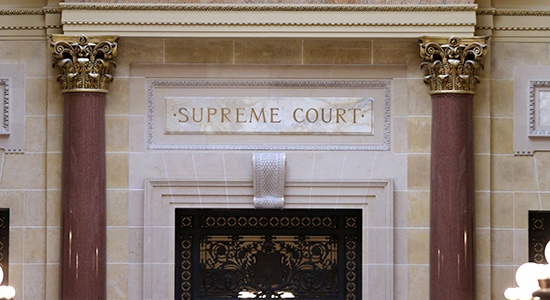
Jan. 26, 2017 – A driver charged and convicted for drunk driving, seventh offense, recently lost an appeal to the Wisconsin Supreme Court, which ruled (4-3) that an officer did not violate the driver’s Fourth Amendment rights during a traffic stop.
In 2014, Madison Police Sergeant Bernard Gonzalez was on neighborhood gang watch when he observed a car stop in the middle of the street for 10-15 seconds before a passenger exited the vehicle and the vehicle proceeded ahead. Gonzalez followed the car and learned that the vehicle’s owner, a woman, had a suspended license.
Sgt. Gonzalez stopped the vehicle. But when he approached the car, he discovered the driver was a man, Frederick Smith, who had borrowed his sister’s car.
Gonzalez proceeded with the stop and when Smith indicated the driver-side door and window were broken, he walked to the passenger-side door.
Gonzalez later testified that he and Smith simultaneously opened the passenger door in order to communicate. At that point, the officer observed signs of intoxication and Smith was arrested and charged with drunk driving, his seventh offense.
Smith, who registered a .38 blood alcohol level, ultimately pled guilty after the circuit court judge denied his motion to suppress evidence on the basis of an illegal stop.
Smith argued police had reasonable suspicion to make a stop because the car’s owner, a woman, had a suspended license. But when the officer realized the driver was a man, he argued, the stop should have ended because reasonable suspicion dissolved.
Citing inadequate arguments from the state, the appeals court vacated Smith’s conviction and ordered the circuit court to grant the suppression motion but did not decide the case on the merits. Recently, the Wisconsin Supreme Court reversed.
Majority Rules
In State v. Smith, 2018 WI 2 (Jan. 9, 2018), a supreme court majority (4-3) held that “when an officer conducts a valid traffic stop, part of that stop includes checking identification, even if the reasonable suspicion that formed the basis for the stop in the first place has dissipated.”
The majority said the stop did not need to terminate immediately once Gonzalez learned that the driver could not be the driver that had a suspended license.
In an opinion by Justice Rebecca Bradley, the majority also rejected Smith’s argument that the officer violated his Fourth Amendment rights by opening the passenger door.
Opening the door did not violate Smith’s rights because it was necessary to communicate effectively – the driver-side door and window did not work – and “the officer’s actions, viewed objectively, would warrant a person of reasonable caution to believe the action taken was appropriate,” Justice Bradley wrote.
The majority noted that the U.S. Supreme Court has ruled that checking a driver’s license and making ordinary inquiries are part of the officer’s traffic mission and do not violate the Fourth Amendment if the officer made a lawful traffic stop.
“There is no dispute that the initial seizure of Smith (the traffic stop) was justified,” Justice Bradley wrote. “[The officer) had a legal basis to stop the car Smith was driving.”
But even though that legal basis dissipated when the officer learned the driver could not be the vehicle’s owner, the Fourth Amendment did not require him to walk away.
“According to the [U.S.] Supreme Court, the Fourth Amendment does not compel such an about-face because the mission of any lawful traffic stop includes routine measures like checking a driver’s license,” Justice Bradley wrote.
Dissenters
Three justices dissented. Justice Daniel Kelly wrote a dissenting opinion, joined by Justices Ann Walsh Bradley and Shirley Abrahamson.
Justice Kelly said Smith is “not a sympathetic character,” the officer fortunately stopped him before he killed someone, and drunk drivers need to be stopped in Wisconsin.
“None of that, however, has anything to do with the proper understanding of the Fourth Amendment’s proscription against unreasonable searches and seizures,” he wrote.
Justice Kelly used a vignette to accentuate his dissent, describing a fictional soccer mom, Mrs. Brown, who borrows a neighbor’s car to take her children to soccer practice. The neighbor, Mrs. Jones, did not realize that her husband’s license was suspended.
In Kelly’s story, the officer tells Mrs. Brown that he made a mistake in stopping her and no longer has reasonable suspicion of wrongdoing, but says she is not free to leave.
“I mistakenly pulled you over in the first place,” Officer Doe tells Mrs. Brown in Kelly’s hypothetical. “However, a new Wisconsin Supreme Court decision, State v. Smith, says I can compel you to remain here until I finish satisfying my curiosity on these subjects.”
The vignette illustrates one of many points: “Authorizing a police officer to seize an individual when there is no reasonable suspicion of wrongdoing is enough to send a tremor through the foundation of the Fourth Amendment,” Kelly wrote.
Justice Kelly suggested the majority’s decision could embolden police to expand the “usual inquiries” that accompany traffic stops, even if there is no reasonable suspicion, which provides more time for police to collect information about those seized.
He said the officer’s duty with respect to Smith was to inform Smith that he was free to leave, not request his identification or make other inquiries.
“Of course, if the officer develops a reasonable suspicion of wrongdoing during this brief interaction, he may proceed with the seizure just as if the reasonable suspicion had never lapsed,” Justice Kelly wrote.
Justice A.W. Bradley wrote a separate dissent, joined by Justice Abrahamson. A.W. Bradley said the majority departed from clear precedent on this constitutional issue.
Smith had an expectation of privacy in the interior of the vehicle and it was not necessary to open the passenger-side door to communicate with him.
“Applying the clear precedent under the facts presented, I conclude that Smith’s Fourth Amendment rights were violated when Gonzalez opened Smith’s passenger-side door without a warrant or consent,” wrote Justice A.W. Bradley, who said the majority of the court continues a trend of “diminishing Fourth Amendment protections.”
